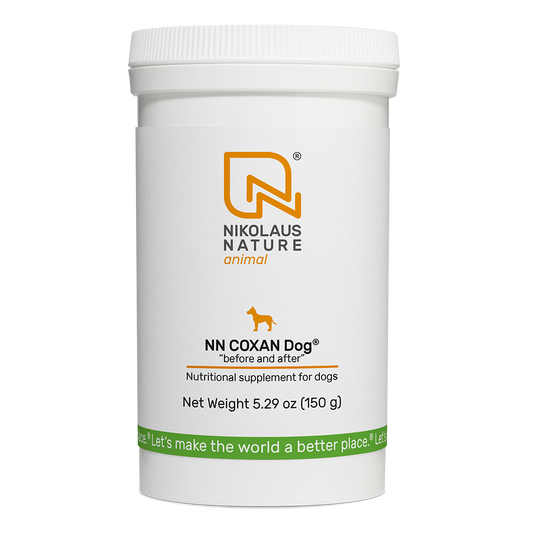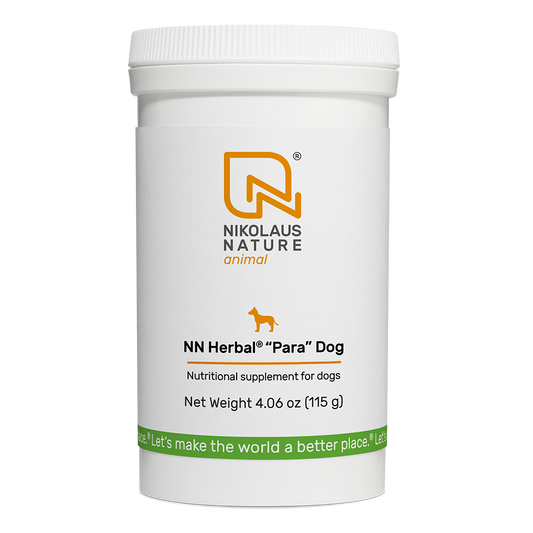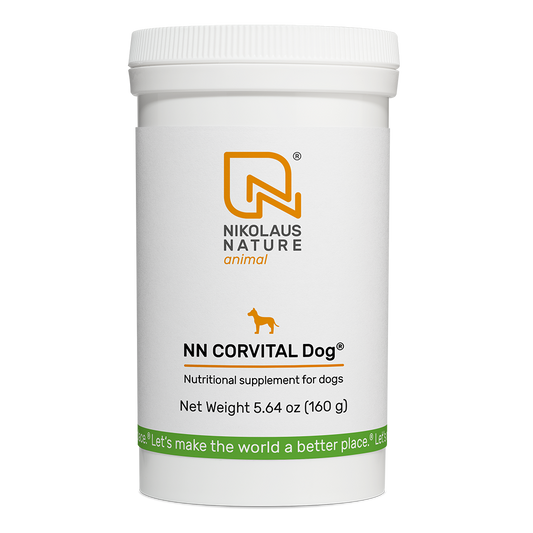Parasites and Their Consequences for Dogs
Parasites in pets, specifically dogs, are not only bothersome but also pose several dangers. They can carry diseases and cause infections within the dog's body. In this blog post, we will explain the best ways to keep these pests away without resorting to chemical preparations and discuss other measures you can take in the fight against parasites of all kinds.

External vs internal parasites
Parasites that threaten dogs can be categorized into two forms: ectoparasites (external parasites) and endoparasites (internal parasites):
- Ectoparasites are pests that infest dogs externally, such as fleas, ticks, hair lice, or mites. On the other hand, endoparasites include all pests that settle in the intestines or other organs of the body, such as giardia and various types of worms.
- Endoparasites seek out a host, infest it, and feed on nutrients from the intestines or blood. Therefore, if left untreated for an extended period of time, a worm infestation can lead to severe nutritional deficiencies. Ectoparasites primarily cause damage to the skin.
Each type of parasite infestation can occur with varying degrees of severity and tends to proliferate on and within the body. Overall, it is crucial to address parasite infestations promptly to ensure the well-being of your dog. By implementing effective preventive measures and seeking appropriate treatment when necessary, you can protect your furry friend from the harmful consequences of these parasites.
How does infection with parasites occur?
Internal parasites enter the body through the mouth or nose. It is enough for the dog to come into contact with infectious eggs or larvae during a walk. These can be found in the feces of other dogs, on carrion, or even on plants. Sometimes they can also be brought home on the dog owner's shoes or stick to the dog's fur after contact with other dogs. The eggs are highly resistant - if they are ingested through the mouth or nose, the parasite infection takes hold. Puppies whose mother has previously had a worm infestation are also highly likely to be born with worms. External parasites also lurk outdoors: ticks, mites, and fleas await their victims in forests and meadows.
Risk assessment of parasite infestation
Unfortunately, our dogs are highly susceptible to various types of worms and external parasites. The individual risk of infestation depends on several factors, including age, exercise habits, diet, and living conditions. Generally, animals that have limited exercise and no contact with other animals have a low risk. Animals that have supervised exercise and contact with other animals have an average risk. Animals with unrestricted exercise without supervision, as well as those in animal shelters, breeding facilities, households with multiple animals, and hunting dogs, have a high risk of parasite infection. However, it has been observed that very healthy dogs are less susceptible to parasite infestations due to their strong immune systems and effective defense mechanisms.
Nevertheless, the risk should not be underestimated because in severe cases, not only the dog's health is at stake but also that of humans. Some of these parasites can be transmitted from dogs to humans (zoonosis) or carry dangerous diseases. It is crucial to take preventive measures and seek appropriate treatment for our dogs to minimize the risk of parasite infestation. Regular check-ups with a veterinarian and maintaining good hygiene practices can help protect both our furry friends and ourselves from the potential dangers associated with these parasites.
Recognizing parasite infestation quickly
Determining whether a dog is infested with internal parasites can be challenging and depends on the severity of the infestation. Adult, healthy dogs often show few specific symptoms, but in puppies, it can manifest as developmental disorders and lethargy. Even if no symptoms are present, however, the dog may still be a source of infection for the environment. Possible symptoms of endoparasite infection include:
- Itching around the anus (the dog scooting its rear on the floor)
- (bloody) diarrhea and/or vomiting
- Constipation or abdominal pain
- Nutritional deficiencies leading to symptoms
- Loss of appetite and weight
- Dull coat or hair loss
- Bloated abdomen
- Ear infections, skin irritations, or eczema
- Increased susceptibility to infections
On the other hand, external parasites are easier to detect and may exhibit the following symptoms:
- Itching
- Local swelling of the skin
- Redness of the skin
- Allergic reactions
- Ear infections
- Physical presence of the parasite on the dog's body
It is important to be vigilant and regularly check your dog for any signs of parasite infestation. If you notice any of these symptoms or suspect an infestation, it is advisable to consult a veterinarian for proper diagnosis and treatment. Early detection and intervention can help prevent further complications and ensure the well-being of your furry companion.

Effects on dogs and the environment
Symptoms can range from harmless bites with temporary itching to serious diseases such as Lyme disease. For puppies, tapeworms can have severe health consequences. Parasites that reside in the body secrete toxins and metabolites, which can lead to diseases and allergies. Mites can cause severe skin diseases, including fur loss and intense itching. Pathogens transmitted by ticks, such as Anaplasmosis, Lyme disease, or TBE, also pose a significant danger. Infestation weakens the immune system, which can result in additional symptoms like allergies and infections. Therefore, it is crucial to prevent parasite infestation through appropriate measures or take action in acute cases.
Source of danger for humans
Some parasites that affect dogs can also be hazardous to humans. There is an increased risk of infection and transmission for children who play with infected dogs or come into contact with roundworm eggs, such as in sand at playgrounds. Immunocompromised individuals, the elderly, patients undergoing immunosuppressive therapy or chemotherapy, pregnant women, people with autoimmune diseases or organ transplants, farmers, livestock breeders, and hunters are all susceptible. The health risks associated with these parasites are diverse:
- Zoonotic infections
- Allergic reactions
- Skin irritations
- Intestinal disorders
- Neurological complications
- Organ damage
It is essential to be aware of these risks and take necessary precautions when interacting with dogs or environments where parasites may be present. Regular veterinary check-ups for dogs and practicing good hygiene habits can help minimize the risk of infection for both dogs and humans.
Quick measures in acute infestation
If parasites are suspected and cannot be removed from the dog yourself, it is advisable to consult a veterinarian or therapist. A visit to the vet with a detailed fecal examination is necessary when signs such as bloody diarrhea, severe vomiting, emaciation, or unusual behavior after a tick bite occur. Caution should be exercised with deworming: it is only beneficial if the dog is currently infested. It is a common misconception that chemical deworming treatments have preventive or long-term effects. In reality, the active ingredient becomes completely degraded and ineffective after approximately 24 hours. What remains is a disrupted and damaged microintestinal flora. Therefore, many dog owners are skeptical of chemical dewormers. Ideally, proactive measures should be taken to prevent any kind of parasite infestation in dogs.
Prevention is better than cure
As is often the case with parasites, it is better to prevent them rather than suffer from their effects. If you want to effectively protect your dog from parasites, it is important to take appropriate and consistent measures at an early stage:
- After walks, carefully inspect your dog's skin and fur for any signs of pests and promptly remove them. Existing bites can be cooled or soothed with itch-relieving ointments.
- If intestinal parasites are suspected, fecal samples can be examined in a laboratory before implementing further parasite control measures.
-
Boost the immune system:
A strong immune system makes it more difficult for parasites to attach themselves to or inside the body. Using appropriate preparations or herbal mixtures can help naturally change the intestinal environment to make it unattractive for worms and other parasites, or even eliminate them alive. A strong immune system also has the strength to fight off pests.
By taking these preventive measures, you can significantly reduce the risk of parasite infestation in your dog.

Feeding as part of parasite prophylaxis
A nutrient-rich diet can promote skin health, strengthen the immune system, and support normal intestinal and digestive functions, thereby contributing to parasite defense. Dogs that have a balanced and robust body and gut environment become less attractive to pests and are less likely to be infested. An intact immune system can also effectively defend against parasites and the associated symptoms.
By incorporating a proper diet into your dog's routine, you can enhance their overall health and reduce the risk of parasite infestation.
Ingredients for worm repellent feeding
-
Coconut oil and coconut flakes:
Coconut can be added to the dog's food as a preventive measure as well as during an acute infestation. When regularly mixed with the food, it boosts the body's natural defenses and contributes to a healthy intestinal flora that repels worms. -
Pumpkin seeds:
The amino acid cucurbitin found in pumpkin seeds can have a mild anesthetic effect on worms, preventing them from attaching to the intestinal wall and making it easier for the body to eliminate them. -
Turmeric:
Known for its antiseptic properties, turmeric can alleviate symptoms caused by intestinal parasites. Its antimicrobial properties can also harm intestinal worms. -
Carrots:
Carrots can help support the elimination of worm eggs. They are also rich in vitamin C and zinc, which support the natural functioning of the immune system. -
Natural preparations:
There are various natural preparations available that contain a mix of nutrients and vital substances specifically designed to support the immune system and promote a healthy intestinal flora tailored to the needs of dogs.
By incorporating these ingredients into your dog's diet, you can help prevent parasite infestations and support their overall health.






